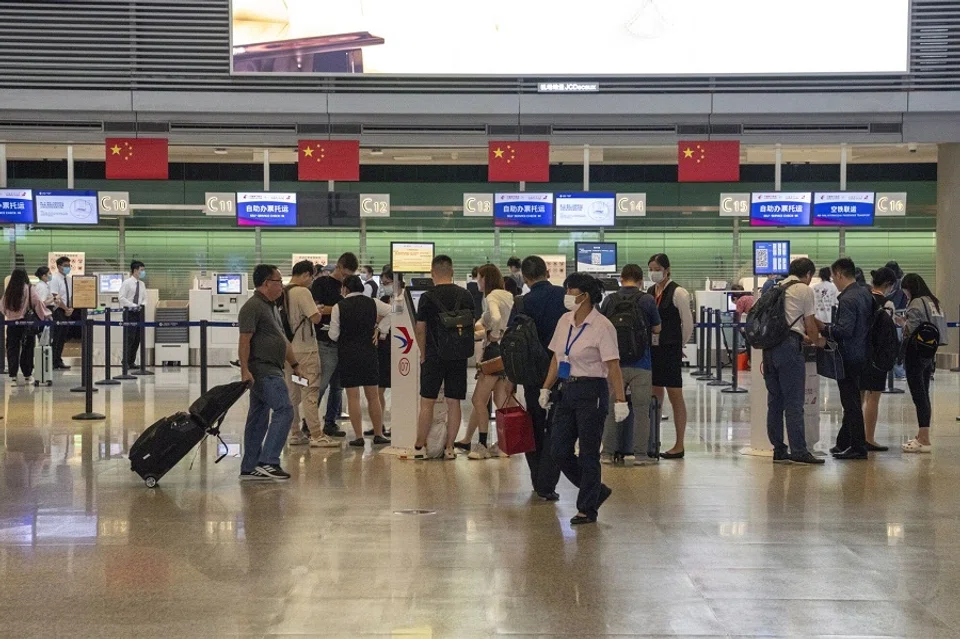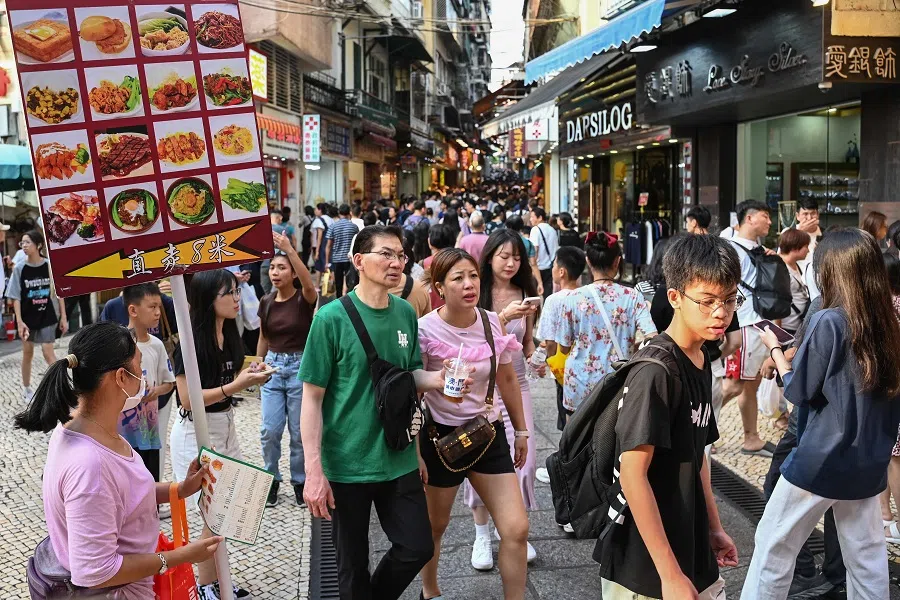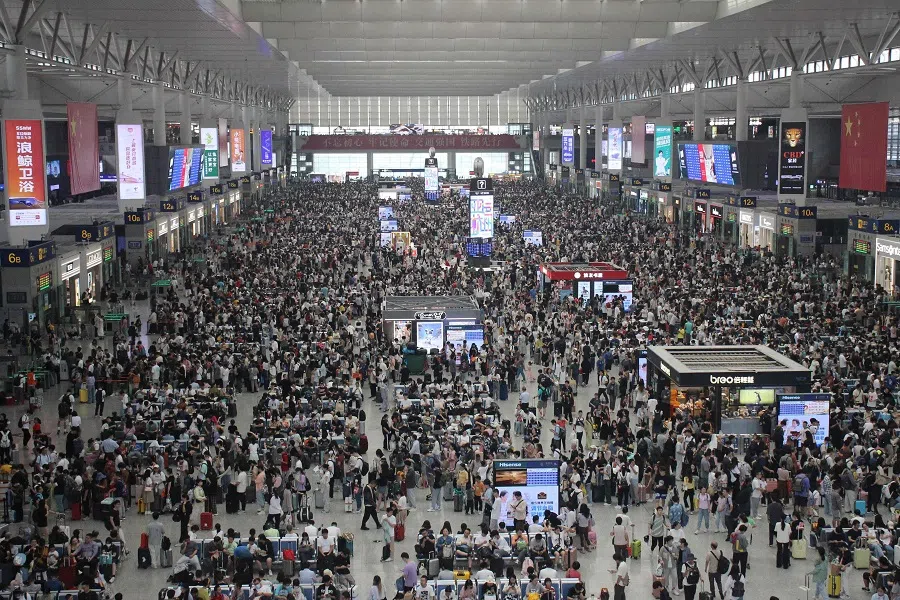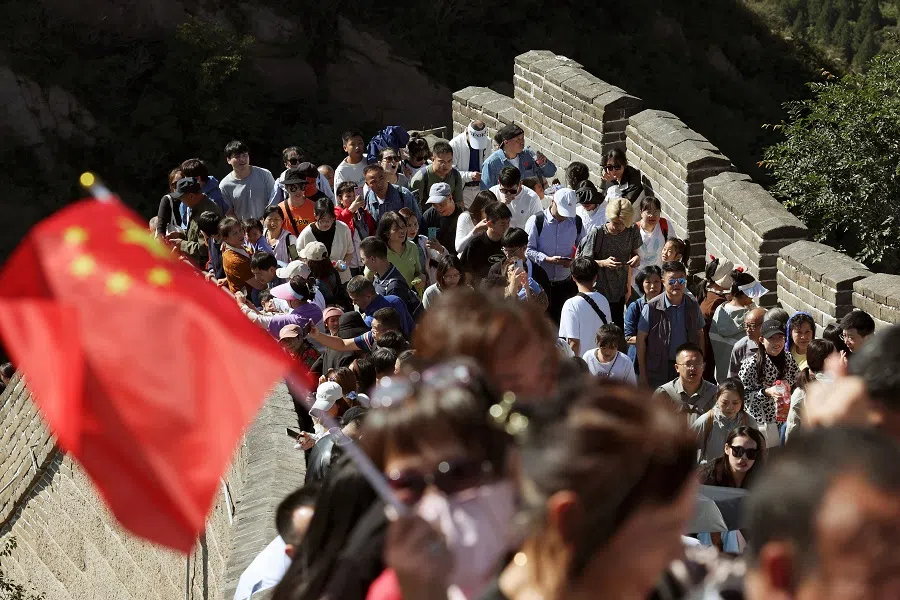Where are the Chinese tourists?
The Golden Week holiday in China is usually the peak period for travel and tourism, and tourist revenue. But even with the lifting of travel restrictions following the pandemic, the number of Chinese travellers going overseas is far from what it was before. Where are the Chinese tourists?

At Changi Airport to fly back to Shanghai from Singapore a couple of days ago, advertisements on UnionPay cards and WeChat pay discounts targeted at Chinese consumers were everywhere, with several counters promoting "Golden Week" sales.
However, relative to the slew of ongoing promotions, there were not as many Chinese tourists at the airport as expected. The counter staff said while there were more Chinese tourists this year, it was still far less than before the pandemic. "I wonder where they've gone?"
... most of the Chinese tourists coming to Singapore during the Golden Week period are individual travellers, with group tours down sharply by 80% compared to pre-pandemic days.
Factors affecting travel
In the first "1 October" Golden Week holidays since China eased Covid-19 restrictions, the number of travellers has risen exponentially. China Railway forecasts that it will serve an expected 190 million people nationally over the Golden Week holidays, while the Civil Aviation Administration of China forecasts that around 21 million tourists will travel out of the country during the holidays.
However, travel agencies in Singapore noted that most of the Chinese tourists coming to Singapore during the Golden Week period are individual travellers, with group tours down sharply by 80% compared to pre-pandemic days. This is partly due to an appreciating Singapore dollar, which means higher costs of travelling, and also partly due to the negative news surrounding Southeast Asia this year, causing the Chinese to be concerned about being abducted by scam syndicates as they transit in Thailand on their flight to Singapore.
Hong Kong, next to mainland China, has also not benefited much from Golden Week travel. Data from its Immigration Department shows that during the first two days of the holidays, only 280,000 visitors arrived in Hong Kong from mainland China, half the number going in the other direction. The Hong Kong China News Agency reported that this had to do with factors including the depreciation of the renminbi (RMB), meaning it would be cheaper to spend in mainland China than in Hong Kong.

As for Thailand, where prices are relatively cheaper, it announced in late September that it would be offering Chinese tourists visa-free entry for five months - but in the wake of the Siam Paragon shooting last week, resulting in one Chinese tourist dead and one injured, many Chinese have cancelled or cut short their trips to Thailand.
A Shanghainese friend of mine said self-deprecatingly: "I can't afford the places I want to go, and the places I can afford, I don't dare visit! I guess I'll just take a day trip somewhere nearby."
... the three-year-long pandemic has not only changed the travel choices of Chinese tourists but also their consumption habits.
Change in spending habits
According to statistics compiled by the Ministry of Culture and Tourism (MCT), in the first three days of the Golden Week, there were a total of 395 million domestic travellers, up 75.8% year-on-year, which brought about 342.24 billion RMB (US$47.5 billion) in revenue, up 125.3% year-on-year. Data from China's Ministry of Commerce showed that in the same period, the number of customers in major commercial districts in 36 large and medium-sized Chinese cities rose by 132.1% year-on-year.
Data from tourism boards across China showed that popular tourist spots during the Golden Week include areas like Beijing, Shanghai, Chengdu and Hangzhou, which is currently hosting the Asian Games. MCT estimates that total domestic travel figures should hit 896 million, a year-on-year growth of 86%, with realised revenue at 782.5 billion RMB, a year-on-year growth of 138%.
China was the world's largest tourism source market before the pandemic, with total international tourism expenditure reaching US$255 billion in 2019, which is why the tourism sectors of various countries are focused on where Chinese tourists are going. But based on the performance of the first post-pandemic Golden Week holiday, the three-year-long pandemic has not only changed the travel choices of Chinese tourists but also their consumption habits.
... gone are the days when Chinese tourists go on shopping sprees overseas.

Statistics from the Japan National Tourism Organization showed that in the first quarter of the year, Chinese tourists spent the most on snacks and other food items, while spending 47.2% less on cosmetics and perfumes than during the same period in 2019 - electronics did not even make it to the top ten most purchased categories. According to a study by Bloomberg, Chinese consumers are increasingly choosing to purchase luxury goods domestically as opposed to abroad. In other words, gone are the days when Chinese tourists go on shopping sprees overseas.
While Chinese tourists are increasingly staying within borders and spending less, amid the country's heightened risks in the property sector, slowing investment growth, lacklustre export demand and soaring local government debt, the stronger-than-expected rebound of the tourism sector remains one of the few bright spots in China's economy.
Before consumption of big-ticket items such as houses and electrical appliances recovers, the rapid rebound of small and frequent consumption such as domestic travel is expected to boost domestic demand, as every little bit counts. On the other hand, as the global economy slows down once more after the quick rebound from the pandemic, and the wave of revenge travel in various countries declines amid inflationary pressure, the countercyclical Chinese market is expected to reinvigorate the global economy.
Chinese cross-border travel is not expected to return to pre-pandemic levels until the end of next year due to cumbersome visa applications and expensive cross-border flights.
Recovery efforts
The World Travel & Tourism Council estimates that Chinese cross-border travel is not expected to return to pre-pandemic levels until the end of next year due to cumbersome visa applications and expensive cross-border flights. Notwithstanding, the long-term prospects for this huge market remain promising.

However, if geopolitical risks further intensify and China's relations with neighbouring countries remain tense, it would be even more difficult for Chinese tourists to make outbound trips. If China's economic prospects remain grim, unemployment rate remains high and salary growth remains weak, it is also questionable how long this revenge spending boom will last. The ability of the government and industry experts to keep the momentum of the domestic demand recovery going and spot opportunities along the way is put to the test.
On 29 September, the General Office of the State Council proposed 30 measures to further unleash the potential of tourism consumption by enhancing premium travel goods and services, among others. DFS Group, the travel retail arm of luxury conglomerate LVMH, plans to build a major shopping and entertainment complex in Hainan to seize business opportunities in China's domestic travel market.
When the next long holiday comes, will more Chinese tourists choose to stay within China or step outside? Travel industry experts around the world are eagerly awaiting an answer to this question, which will also serve as a gauge of China's economy.
This article was first published in Lianhe Zaobao as "中国游客去哪儿?".



![[Video] George Yeo: America’s deep pain — and why China won’t colonise](https://cassette.sphdigital.com.sg/image/thinkchina/15083e45d96c12390bdea6af2daf19fd9fcd875aa44a0f92796f34e3dad561cc)
![[Big read] When the Arctic opens, what happens to Singapore?](https://cassette.sphdigital.com.sg/image/thinkchina/da65edebca34645c711c55e83e9877109b3c53847ebb1305573974651df1d13a)
